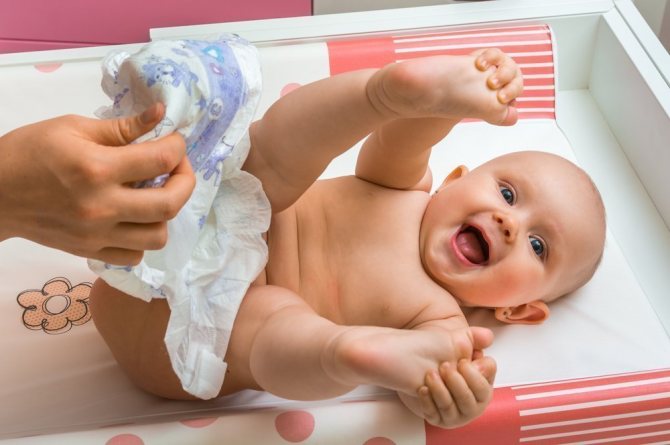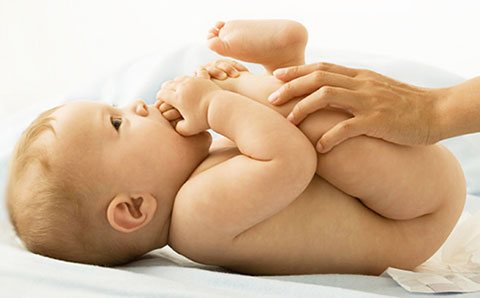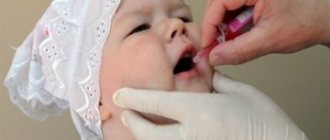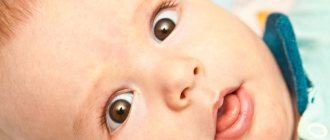Why do parents want to know how many times a day a child should write? It's not just about the number of diapers changed. Young mothers want to keep control over any physiological processes of the child, to know that development is progressing in a timely manner, and the baby is in no way behind its peers. After all, this often happens: the mother of a one-year-old child said during a walk that her son no longer pees at night. All the young parents participating in the conversation immediately wondered why my Sasha (Petya, Oksana), at 2.5, still continues to write at night. In addition, knowing approximately how many times a day a child should pee, one can suspect cystitis, urethritis, and even pyelo- and glomerulonephritis - serious kidney diseases. Let's monitor the frequency of urination in children of different ages.
How many times a day should a child write, depending on age.
Babies in maternity hospitals pee very little during the first days of their lives - 2-3 times, while releasing urine of an unusual orange color. The medical staff warns mothers in advance about this feature. With the first urine, a lot of metabolic products and very little liquid are released (who has a lot of milk on the first day after birth?), so the color of the baby’s first urine is rich, orange-red.
On the second or third day of life, the child pees as many times a day as an infant should: 16-18 times during the day and 4-6 times at night. In total, the number of urinations per day should be 20-25 times. Such a complex calculation can be simplified: during the day, children under one year old pee almost every hour.
From the age of six months, a child should write 10-12 times during the day and 4-5 times at night. The number of “small” trips per day is about 15-16 times.
How many times a day should a child pee per year? A one-year-old child urinates 10-12 times per day. In this case, there may not be night trips to the toilet (but it is acceptable to urinate 1-2 times at night and 8-10 times during the day).
By the age of five, a child urinates 7-9 times a day. No more than 1-2 night trips to the toilet are allowed. The bladder is large enough to hold urine for about two hours during the day.
What determines how many times a day a child pees?
Thanks to the well-known advertising (“I drink and pee!”), most parents clearly understand that the child secretes approximately as much fluid as he drinks.
If a child drank a lot (water, tea, juice), then it is logical that he will write more and more often. The same can be said if the baby ate a lot of watermelon or cucumbers (it’s no secret that an adult also secretes a lot more fluid after this!).
If the child is cold (or has frozen feet), he will pee more often. The number of urinations decreases in the heat (when a significant part of the liquid is excreted through sweat).
Breastfed babies urinate more often and more abundantly than bottle-fed babies. Usually it is the mothers of artificial babies who are the first to discover a completely dry diaper in the morning after a night out. But this is not an argument in favor of formula feeding: formula-fed babies are much more likely to suffer from constipation.
When should parents worry?
If you know approximately how many times a day a child should pee, then it will be easier for you to understand that something has gone wrong.
With cystitis or inflammation of the urethra, the number of small trips increases sharply both during the day and at night. Urine is released 2-3 times more. The baby complains of pain or cries and screams when he pees.
Regular, frequent trips to the potty at night can become a threatening symptom. This is how serious kidney diseases manifest themselves (glomerulonephritis, pyelonephritis and even renal failure).
If your child urinates too infrequently, you should consider whether your baby is suffering from dehydration. A decrease in urine output by even one quarter of the normal amount is already a reason to sound the alarm.
Typically, the amount of urine directly depends on how much liquid the child drinks. But if you know that nothing has changed significantly in the baby’s drinking regime, and he began to excrete more/less urine, you should contact your pediatrician.
Tags: Urination, peeing, baby peeing
- Related Posts
- How to strengthen a child's nervous system?
- How to prepare a cough remedy with soda and milk?
- How to help your baby teething?
« Previous entry
Normal urinary frequency
Important! Copious, clear urine with regular urination is a sign that the child is healthy, well-nourished, and has enough fluid in his body.
One of the concerns that worries parents is how often do babies usually pee, is the frequency of urination of their baby consistent with the norm? Moms and dads should realize that there are no clear standards in this regard. Each baby is its own world. There are those who can urinate fifteen times a day, and those who only 7-8.
Experts say that when a baby is breastfed, one way to determine if he is getting enough milk is to record how many times a newborn pees a day. If your baby urinates at least 10 times a day and the urine is clear, he is getting the right amount of milk. Even the need to weigh the baby before and after feedings is eliminated.
In other words, wet diapers are a good indicator (in addition to complexion, satisfied appearance after feeding, normal feces and weight of the infant) to assess the adequate nutrition of the newborn.
Important! If the urine color is light yellow, it means your child is drinking enough. Urine that is too concentrated indicates insufficient hydration.
From birth to six months
The baby urinates for the first time in the maternity hospital during the first 12-24 hours after birth. Peculiarities of urination in children in the first months of life:
- During the first few days, a breastfed baby pees little, 3-5 times a day. This is explained by the fact that the colostrum contained in the female breast at the beginning of lactation is very fatty and thick, and the baby’s urinary system is still in the process of adaptation. Infants who receive formula early on may urinate more frequently;
- In the first few days, a newborn's urine is very concentrated and may even contain uric acid crystals, which cause the fluid to appear pink, red, or orange;
Orange newborn urine
- Around the fifth or sixth day, when the baby begins to receive more milk, the urine becomes pale yellow or almost colorless and has virtually no odor;
- A newborn's bladder is very small; it can hold no more than a tablespoon of urine. That is why the baby should empty it more often. Some one-month-old newborns urinate up to 30 times a day, but the average norms are as follows: boys - 20 times daily, girls - 22-25 times.
Important! At night, when the baby is sleeping, there is no need to change his diaper; it is enough to do this before and after feeding, every 2-3 hours.

Changing a baby's diaper
From six months to a year
Many mothers begin introducing complementary foods to their infants at 6 months of age. The baby’s urinary system continues to develop, and the capacity of the bladder increases. At this time, the color of urine may change, depending on the type of food eaten, and the number of urinations decreases. Some children almost stop peeing at night, or the number of nighttime urinations sharply decreases.

Baby's urine
Determining how many times a day a child should pee at this time becomes more difficult, as he begins to receive more varied food and physical activity increases. The emotional state of the baby is also very important. During nervous stress, for example, weaning a baby, urination may become more frequent. The average frequency of urine excretion is 15-16 times daily. In the second year of life, the frequency of urination continues to decrease and reaches 10-12 times daily.
What's the norm?
The normal amount of urination in children of the first year directly depends on the age of the baby. But at the same time, these frameworks are very flexible, because if the child drinks a lot and with pleasure, then the baby will write more often.
- After birth, newborns may not write for about a day. The color of urine at first is far from standard: it can be orange, brown or reddish. In the first week, babies pee up to 5 times a day. Gradually, the functioning of the excretory system improves, and the frequency of urination, as well as the color of the secreted fluid, returns to normal.
- Up to six months, a child removes from the body from 300 to 500 ml per day. liquids. On average, the number of urinations at this age ranges from 20 to 25, and the volume of each of them is up to 35 ml.
- Gradually, the baby's bladder stretches, it begins to hold more liquid, so the volume of each urination increases and the frequency decreases. The child now pees about 16 times a day, while his bladder accumulates up to 45 ml of urine.
If there are slight deviations from the norm, you should not worry. You need to think about it and urgently look for the reasons for the failure in the urination regime together with the pediatrician if the baby pees half as often or more often than expected. In this case, not only the intervals between bladder emptyings and fluid volumes, but also the color of urine, which characterizes its concentration, will be important for diagnosis.
Normal urine volume
How much formula should a 4 month old baby eat?
A disposable baby diaper absorbs moisture well, so determining how much urine is released during urination is not always easy. To test how much your baby can pee at one time, pour two tablespoons of water into a clean, dry diaper. This is what the diaper will look like after your baby has produced normal urine.
On average, at one time an infant under the age of 6 months excretes 20-35 ml of urine, the total daily amount is 0.3-0.5 liters. A one-year-old baby can already write up to 45 ml, the breaks between urinations increase, and more urine accumulates. However, the daily volume of urine increases slightly – up to 0.6 liters.
After a year the changes are more significant. A one-time excreted volume of urine in a two-year-old child can reach up to 90 ml, and a daily volume of urine can reach up to 0.8 liters.
Causes of urinary frequency problems
How long should a newborn baby sleep between feedings for up to a month?
The kidneys of newborns are just beginning to adapt to urine excretion. They cannot yet remove toxins using minimal amounts of water. Liquid food for infants allows the kidneys to work in a gentle manner; toxins dissolve in large amounts of water, only remaining in the kidneys for a short time. This is why urination occurs almost immediately after taking breast milk or formula, and the urine has an almost transparent color. This reduces the risk of toxins accumulating in the kidneys.
How many times a day a newborn baby should pee is determined, in addition to physiology, by external factors. For example, if the number of urinations decreases, this may be due to the following factors:
- High ambient temperature. The baby probably sweats a lot, and some of the fluid is removed from the body through the sweat glands, so he will pee less;
- The baby is not getting enough fluids. Children on artificial and mixed feeding must be given water to drink;

Urine color when dehydrated
Important! If the baby is breastfed and urinates little and infrequently, he needs to be put to the breast more often for a short period of time. At the beginning of feeding, milk is the most watery, it supplies the baby’s body with liquid.
- In various pathological conditions associated with vomiting, fever and diarrhea, the child’s body becomes dehydrated. In these cases, frequent drinking in small portions (1 teaspoon each) helps to avoid moisture loss.
A child may urinate rarely and in the presence of diseases:
- renal pathologies;
- internal ureteral obstruction;
- urethral pinching;
- back injuries.
When a child urinates too often, it may be due to:
- renal failure;
- cystitis;
- pathologies of the bladder;
- urethritis;
- pyelonephritis;
- diabetes mellitus;
- nervous stress.
Important! If external factors that may cause urinary frequency disturbances are excluded, then it is mandatory to consult a doctor who will establish an accurate diagnosis.
How often should a baby poop?

A child’s stool may not be constant; sometimes a newborn poops 8-10 times a day, and sometimes he doesn’t go to the toilet for days. So how many times should he have a bowel movement? There is no clearly established norm here; it all depends on individual parameters - the baby’s appetite, type of food, intestinal characteristics, etc.
On the first day after birth, the baby will poop black feces (meconium), this can continue for 2-5 days. Up to 2 months, the baby can poop up to 10 times, then gradually bowel function returns to normal, and the child will defecate less often.
A breastfed baby goes to the toilet quite often - up to 7-10 times a day. Normally, the stool should be homogeneous, it can be creamy or liquid, and after 6 months the stool becomes harder as the gradual introduction of complementary foods begins. If you notice blood, mucus, or lumps in the discharge, also contact your pediatrician.
How often a baby poops depends on the type of food he or she eats. If your baby is formula fed, he may go to the toilet less often than when breastfeeding. On formula, babies poop less often - 4 times a day every 3-3.5 hours, while the color of the stool can be very different - from light to dark brown, the smell is more pungent. If there are lumps in the discharge, then most likely the baby’s body does not have time to digest the food, and you are simply overfeeding it. In this case, you should consult a pediatrician.
When complementary foods are introduced into a child’s diet, the consistency of the discharge changes and a characteristic smell of feces appears.
Alarming symptoms
Problems with urination indicate both dehydration and various diseases. In addition to a decrease in the frequency of urine output and a decrease in its quantity, a sign of dehydration is a change in color. Baby urine darkens, and its contact with the baby's skin causes irritation.
How long should a newborn sleep for up to a month?
Possible symptoms of disease:
- Urinary tract infections are accompanied by fever, the baby refuses to urinate and cries. Urine may take on a reddish tint;
Important! The risk of contracting infectious diseases of the urinary system for children in the first three years of life is quite high. About 4% of children suffer from such diseases, most of which the body becomes infected with bacteria entering from the outside, from the urethra.

Symptoms of pyelonephritis in newborns
- With congenital metabolic disorders, several days or months after birth, the baby loses activity, becomes sleepy, inactive, and may experience vomiting and convulsions. Urine and body smell of maple syrup or mustiness;
- Symptoms of congenital diabetes mellitus are greed during sucking, frequent urination, and wet diapers become hard when they dry out.
Other indications for visiting a doctor:
- pink, red or brownish urine after the 4th day of a child’s life;
- the baby urinates less than 6 times a day;
- passing a small amount of dark yellow urine when urinating.
The latter symptoms may indicate a lack of milk during breastfeeding. In this case, the doctor should examine the child and discuss feeding methods with the mother.
If the amount of urine is less than 0.5 ml per 1000 grams of baby's weight in 1 hour, this is called oliguria. When its daily amount is less than 100 ml - anuria.
Important! It is urgent to show the baby to a specialist if there has been no urination for 2 days and the bladder is empty, which, when full, can be clearly felt in the suprapubic area.
Alarming symptoms associated with diseases are rarely observed in infants. However, if they appear, a visit to the doctor is necessary.










